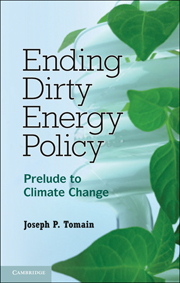Book contents
- Frontmatter
- Contents
- Preface
- Introduction
- 1 A Regulatory History of Dirty Energy Law and Policy
- 2 Protectionist Assumptions
- 3 The Next Generation Is Now
- 4 Consensus Energy Policy
- 5 Fossil Fuel Future
- 6 Electricity Future
- 7 Venture Regulation
- 8 Smart Energy Politics
- 9 Conclusion – Strategies for the Energy Future
- Notes
- Index
Introduction
Published online by Cambridge University Press: 05 June 2012
- Frontmatter
- Contents
- Preface
- Introduction
- 1 A Regulatory History of Dirty Energy Law and Policy
- 2 Protectionist Assumptions
- 3 The Next Generation Is Now
- 4 Consensus Energy Policy
- 5 Fossil Fuel Future
- 6 Electricity Future
- 7 Venture Regulation
- 8 Smart Energy Politics
- 9 Conclusion – Strategies for the Energy Future
- Notes
- Index
Summary
Ending Dirty Energy Policy was completed while the stories and the federal investigations of the Upper Big Branch Mine disaster and the Deepwater Horizon offshore explosion, which appeared intent on killing the Gulf of Mexico, were unfolding. The corporations responsible for these tragedies, Massey Energy and BP, through their CEOs Don Blankenship and Tony Hayward, sadly exemplify the dominant energy policy of the United States: Fossil fuel profits are to be made at the expense of the safety and lives of workers and at the risk of catastrophic, sometimes irreversible, environmental degradation. This callous attitude cannot be blamed on corporations alone. The United States government served as partner to constructing a fossil fuel policy intent on bringing to market cheap and dirty energy. As consumers of cheap fossil fuels, we are complicit as well. The century-old, fossil-fuel-based U.S. energy policy must be transformed for a clean and economically healthy energy future.
The thesis of this book is straightforward. Regardless of one's position on climate change, traditional energy policy and its regulation must be dramatically reformed. In this way, energy policy transformation is a prelude to an effective climate change response. Ending Dirty Energy Policy proposes two dramatic changes. First, traditional energy policy with its fossil fuel favoritism must be rejected. Instead, new energy markets and new entrants that generate energy more cleanly through energy efficiency, and with renewable resources, must be promoted and supported. Second, the twentieth-century model of government regulation must also be rejected.
- Type
- Chapter
- Information
- Ending Dirty Energy PolicyPrelude to Climate Change, pp. 1 - 10Publisher: Cambridge University PressPrint publication year: 2011



